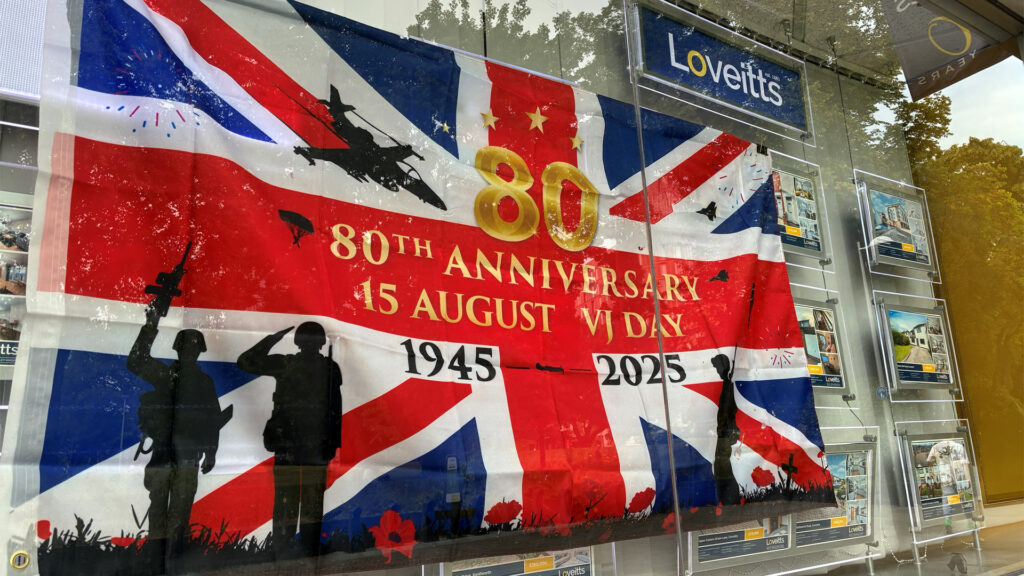For Sheldon Bosley Knight’s associate director and auctioneer, Matt Burrows, today is very special. Eighty years ago Japan announced its surrender to the Allied forces and thus brought an end to WW2.
It was met with relief and joy that after six long years, in which millions were killed and injured, the war was finally over.
Over 90,000 British troops were casualties in the war against Japan, including 30,000 who died and 37,500 who were held as prisoners of war.
Matt’s grandfather, Gunner William Henry Sinclair, was a Far East prisoner of war (POW).
A former officer in the British Army himself, Matt has been a Cadet Force Adult Volunteer of the Army Cadet Force (ACF) in Hereford and Worcester for 16 years.
Mentoring the young cadets is something he is extremely passionate about and earlier this year, he took a group of Army Cadets to the National Memorial Arboretum.
During the visit, he read a citation to the cadets about his grandfather at a bench his family commissioned in his memory in the Far East POW section of the arboretum.
On this very special day in which we commemorate and remember all those who gave their lives for our freedom, here is Matt’s citation.
Today, we gather to honour the life and service of a man whose journey into the British Army began not with intent, but with the humour and happenstance of youth.
Gunner William Henry Sinclair — known to his family and friends as Harry — was born in Dudley in 1916. Like many young men of his generation, Harry’s path was shaped by forces far greater than himself. In the spring of 1935, while enjoying an evening at a local pub, a Recruiting Sergeant painted an enticing picture of Army life. Harry accepted the King’s Shilling in good spirits and, by all accounts, carried on with his night. He had, in fact, forgotten all about it — until a manilla envelope landed on the doormat two weeks later. His father refused to pay the penalty to release him, and so, Harry was duly attested into the British Army in May of that year.
Trained as an Anti-Aircraft Gunner, he served across England before joining 7 Regiment AA, Royal Artillery. In September 1939, at the outbreak of the Second World War, Harry was posted to Hong Kong — a posting that would shape the rest of his life.
On the 7th of December 1941, Japanese forces invaded Hong Kong. Despite a fierce defence, the garrison was overwhelmed, and on Christmas Day, the colony fell. Harry became a prisoner of war. His barracks became his prison. Conditions were brutal. He and his fellow POWs endured hard labour, malnutrition, and the constant threat of violence. Even eye contact with a guard could result in a beating.
In late 1942, prisoners began to be moved to Japan. Harry narrowly escaped death aboard the ill-fated Lisbon Maru, torpedoed unknowingly by an American submarine. Those not killed in the sinking were recaptured and transported to Japan. Harry arrived on the mainland shortly after, where life worsened still. Confined to a cage barely large enough to lie down in, and surviving on raw rice and hot water, the suffering was unimaginable.
He remained a prisoner until Japan’s surrender in 1945. His camp, in the countryside outside Tokyo, spared him the devastation of the atomic bombs.
Harry returned to the UK broken in body, and, though we now understand it, invisible wounds in mind. He spent two years in hospital recovering from the physical toll of war. PTSD, as we now call it, had no name then — no diagnosis, and sadly, no treatment beyond crude attempts at electro-shock therapy. He rebuilt a life in quiet dignity, finding work in the mortuary at Dudley General Hospital and reconnecting with a childhood sweetheart. They married in the 1950s and raised three children. One of them would go on to become the mother of the speaker before you today.
Although I never met my grandfather — he passed away when my mother was only 13 — I carry on his memory with pride. And today, my own son carries his name, Harry, a tribute to a man whose strength, sacrifice and service were extraordinary, even if he would have simply called it “doing his duty”.
Gunner Harry Sinclair — who joined the Army almost by accident and who, despite his fondness for a night out and the occasional telling-off, never wavered in service to his country — reminds us that courage doesn’t always roar. Sometimes, it endures. Quietly. Resolutely. With honour.
May his memory be a blessing and an inspiration to all of us, particularly to you, our Army Cadets — the next generation of our great nation.
Lest we forget.



